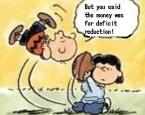Tag Archives : government spending
Tax and Expenditure Limits: The Challenge of Turning Mitchell’s Golden Rule from Theory into Reality
The main goal of fiscal policy should be to shrink the burden of government spending as a share of economic output. Fortunately, it shouldn’t be too difficult to achieve this modest goal. All that’s required is to make sure the private sector grows faster than the government. But it’s very easy for me to bluster […]
read more...Huge Value-Added Tax Increases in Europe Show Why Washington Politicians Should Never Be Given a New Source of Tax Revenue
The most important, powerful, and relevant argument against the value-added tax in the short run is that we can balance the budget in just five years by capping spending so it grows at the rate of inflation, a very modest level of fiscal restraint. The most important, powerful, and relevant argument against the value-added tax […]
read more...How Bureaucrats and Politicians Conspire to Rip Off Taxpayers
I can say with great confidence that government bureaucrats are overpaid compared to people in the productive sector of the economy. Why am I sure that this is true, particularly when the so-called Federal Salary Council claims bureaucrats are underpaid? For the simple reason that the “job opening and labor turnover” data from the Department […]
read more...Where Are the European Spending Cuts?
Paul Krugman recently tried to declare victory for Keynesian economics over so-called austerity, but all he really accomplished was to show that tax-financed government spending is bad for prosperity. More specifically, he presented a decent case against the European-IMF version of “austerity,” which has produced big tax increases. But what happens if nations adopt the […]
read more...Are there any Lessons to Be Learned from the Rogoff-Reinhart Kerfuffle?
For those who haven’t followed this issue, Kenneth Rogoff and Carmen Reinhart wrote an influential paper in 2010 arguing that government debt above 90 percent of GDP was associated with weaker economic performance. It turns out that the Rogoff and Reinhart made a mistake in their excel spreadsheet and this error was publicized in a […]
read more...New European Central Bank Study Finds that Government Spending Undermines Growth
The fiscal policy debate often drives me crazy because far too many people focus on deficits. The Keynesians argue that deficits are good for growth and this leads them to support more government spending. The “austerity” crowd at places such as the International Monetary Fund, by contrast, argues that deficits are bad for growth and […]
read more...The Revised Bowles-Simpson Tax-Hike Plan Might Be even Worse than the Previous Version
I wrote last September that the budget plan put forward by Erskine Bowles and Alan Simpson was fatally flawed. There were some positive features in the plan, to be sure, such as lower marginal tax rates. And I suppose it’s worth noting that the burden of government spending didn’t climb as fast under their proposal […]
read more...An Aggravating Reminder of Government Waste on Tax Day
Remember the Spending Quiz from 2010, which asked people to guess whether absurd examples of government waste were true or false? Well, we have a new video on government waste, though bureaucrats and politicians have become so profligate it doesn’t even bother to trick people with fake examples. While very well done, I do have […]
read more...Entitlement Spending Is America’s Biggest Fiscal Challenge, but Discretionary Spending Is Still Far too High
If America descends into Greek-style fiscal chaos, there’s no doubt that entitlement programs will be the main factor. Social Security, Medicare, Medicaid, and Disability are all fiscal train wrecks today, and the long-run outlook for these programs is frightful. Just look at these numbers from the Bank for International Settlements and OECD to see how […]
read more...Burden of Government Spending Will Be $2 Trillion Higher in 2023 According to Obama’s Budget
If you include all the appendices, there are thousands of pages in the President’s new budget. But the first thing I do every year is find the table showing how fast the burden of government spending will increase. That’s Table S-1 of the budget, and it shows that the President is proposing $41 trillion of […]
read more...


